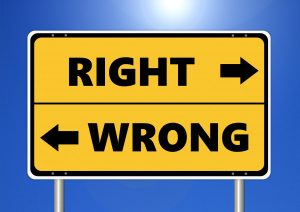
iCLT News: I Am Right, You Are Wrong Or Am I Wrong And You Are Right?
by Bishop Leslie Francisco, III
Minister of Diversity, Equity, and Inclusion
 I Am Right, You Are Wrong Or Am I Wrong And You Are Right?
I Am Right, You Are Wrong Or Am I Wrong And You Are Right?
This question plagues not only the church, but the world and society as a whole. Perspectives and opinions are so varied it’s a wonder we can have community at any level.
My mother once shared a thought with me that caused me to change how I view community and collaboration. “There are enough ways (opinions) in this world for everyone to have at least one.” At the time of this writing, the current world’s population is 8,024,774,998 and growing at a rate of about 64,000 per day.
Over 8 billion opinions on any range of topics from what foods to eat, how to worship, who to worship, whether to engage in minimal or extravagant living, style of dress, etc. I could list a myriad of differences. Who is right and who is wrong? As a peace church, we are called to somehow navigate and lead in the midst of diversity, and create community.
Jesus tells us He came to bring a new way — not of division, disrespect, or defiance. Somehow we have to come to grips with the fact we don’t have absolute answers.
Paul stated in 1 Corinthians 13:9, “For we know in part, and we prophesy in part.”
We only get pieces of revelation rather than have absolute answers. So how do we live in community with this understanding? I offer these 3 reflections:
- Respectful Communication: One of the most important ways to live together in community with differences is through respectful This means actively listening to and acknowledging each other’s perspectives, even if we disagree with them. It’s essential to communicate in a non-judgmental, non-threatening way and to avoid stereotyping, belittling, or attacking one another. By creating a culture of respectful communication, we can work through conflicts and misunderstandings and build deeper connections with each other.
- Embracing Diversity: Another important way to live together in community with differences is to embrace We need to appreciate and celebrate our differences in culture, religion, race, gender, and other identities. We can do this by creating spaces that encourage the sharing of different experiences and perspectives, participating in cultural events, and learning from each other’s stories. Embracing diversity allows us to broaden our understanding and break down prejudices and biases.
- Collaborative Decision-making: Living together in community with differences requires making decisions that reflect the needs and values of everyone involved. Collaborative decision-making is a way to ensure that everyone has a voice and that no one is left This involves taking the time to listen to each other’s ideas and opinions, finding common ground, and compromising when necessary. It’s important to create a culture of openness and respect for all perspectives and to avoid making decisions based solely on one group’s interests. Collaborative decision-making can help build a sense of shared ownership and responsibility for the community.
These are all things that we know and comprehend intellectually but the real question is this: Can we put them into practice? As momma said… “There are enough ways (opinions) in this world for everyone to have at least one.” Whose right and who is wrong? I think we are all wrong until we can see through the eyes of Christ. The old cliche still resounds today: What would Jesus do?
May we find the heart of Christ in our journey to build community and have the compassion to look beyond faults and see the deeper need.
John 13:34-35 “I give you a new commandment: Love each other. Just as I have loved you, so you also must love each other. This is how everyone will know that you are my disciples, when you love each other.”
Shalom
Leslie Francisco III
Minister of Diversity, Equity and Inclusion
interim Conference Leadership Team (iCLT)
